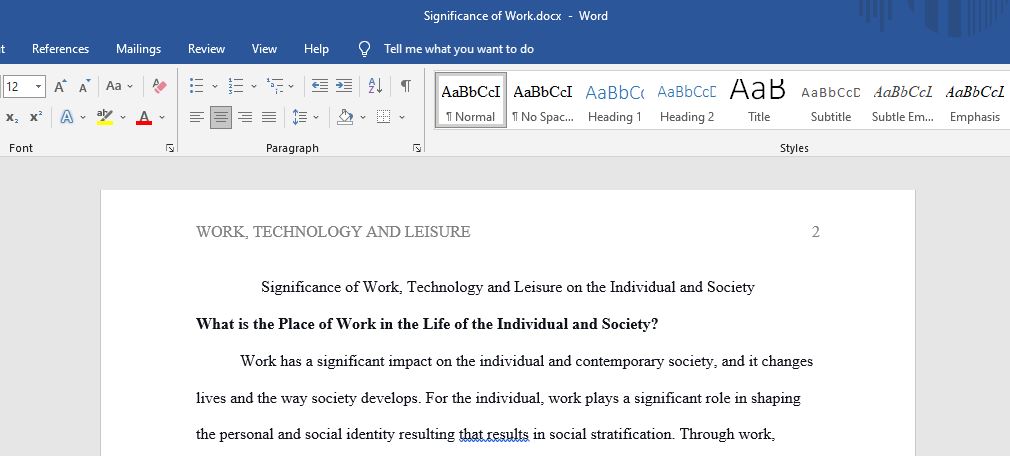Discussion-Significance of Work, Technology and Leisure on the Individual and Society
From seeing artists at work to reflecting on the ways adding artistry in its many forms raises the dignity
of a job, of a labor, of work; from observing the challenges artists face, especially in pursuit of making art
their career and life work, to grappling with the ways the work that goes into art can be destructive;
from witnessing the power of art to advance causes to admiring the power of art to save, to help
survive, and to touch the soul—through these many topics this semester, you have explored a
relationship between labor and art. The Pope’s encyclical has touched on the importance of toil, the
role of technology and vocation, and the challenges of avoiding abuse of the inherent goodness of work.
The videos of potters and calligraphers, among others, have revealed the methods of practiced facture,
while the videos of life-long fishermen and salt harvesters have revealed the ability of humanity to
maintain the dignity of their work through the beauty of how they do it. Cather’s novel and Barry’s play
exposed varying oppositions artists face, from the battles within the artist to the battles with family and
society seeking to downplay the role of art in work or art as work. Murray and Bryan established the
strange and real-life ways art can touch the soul and save, underscoring the importance of what artists
do. Agosín shared the far-reaching effects of art as it stirs, incites, travels, informs, and reminds.
We have had some great opportunities for critical thinking and personal reflecting, and you have shared
these thoughts and reflections with others. In some cases, you have engaged in brief discussions,
despite the limitations of our asynchronous, all-online course. You have read and watched so much
more than what I noted above, and what I especially enjoyed was your relying on your own majors and
life circumstances to add depth to your posts and responses. Furthermore, you have written,
composing ideas in text to share in clear but elegant ways. I know some of you conscientiously added
artistry to all your work for this course, aware of doing a job well if you’re going to do it all, cognizant of
the effect of art in your tasks.
For this week’s class, I’d like you to consider three of the seminar questions. Every seminar has a
different focus—ours is an examination of the roles and effects of art on work and their relationship.
Laborem Exercens helped establish a working understanding of labor and work from a Catholic context
while the other readings and videos helped showcase the relationship between labor and art. In light of
everything you have learned and thought through this course, I’d like you to consider answers to the
following seminar questions:
What is the place of work in the life of the individual and in society?
How do technology and leisure shape our lives?
What part does making a living play in making a life?
Once you have formulated an answer to each, I’d like you to pick your strongest response and present it
in your last Flipgrid post of the semester for this course. Please be sure to note which seminar question
you are addressing, and please express how issues from this course have helped you arrive at your
answer to the question. (For the first seminar question, you may be inclined to drift to “what should the
place of work in the life of the individual and in society be” instead of what the question actually asks. I
will accept an answer to either.) For this final post worth twenty instead of ten points, I am giving you
ten minutes to answer, but you do not need to use all ten. If you answer thoroughly in under five
minutes, I would be fine with it. I just want you to know you have more time and that your response
needs to be indicative of good reflection and must be well-articulated
Answer preview:

word limit:517
